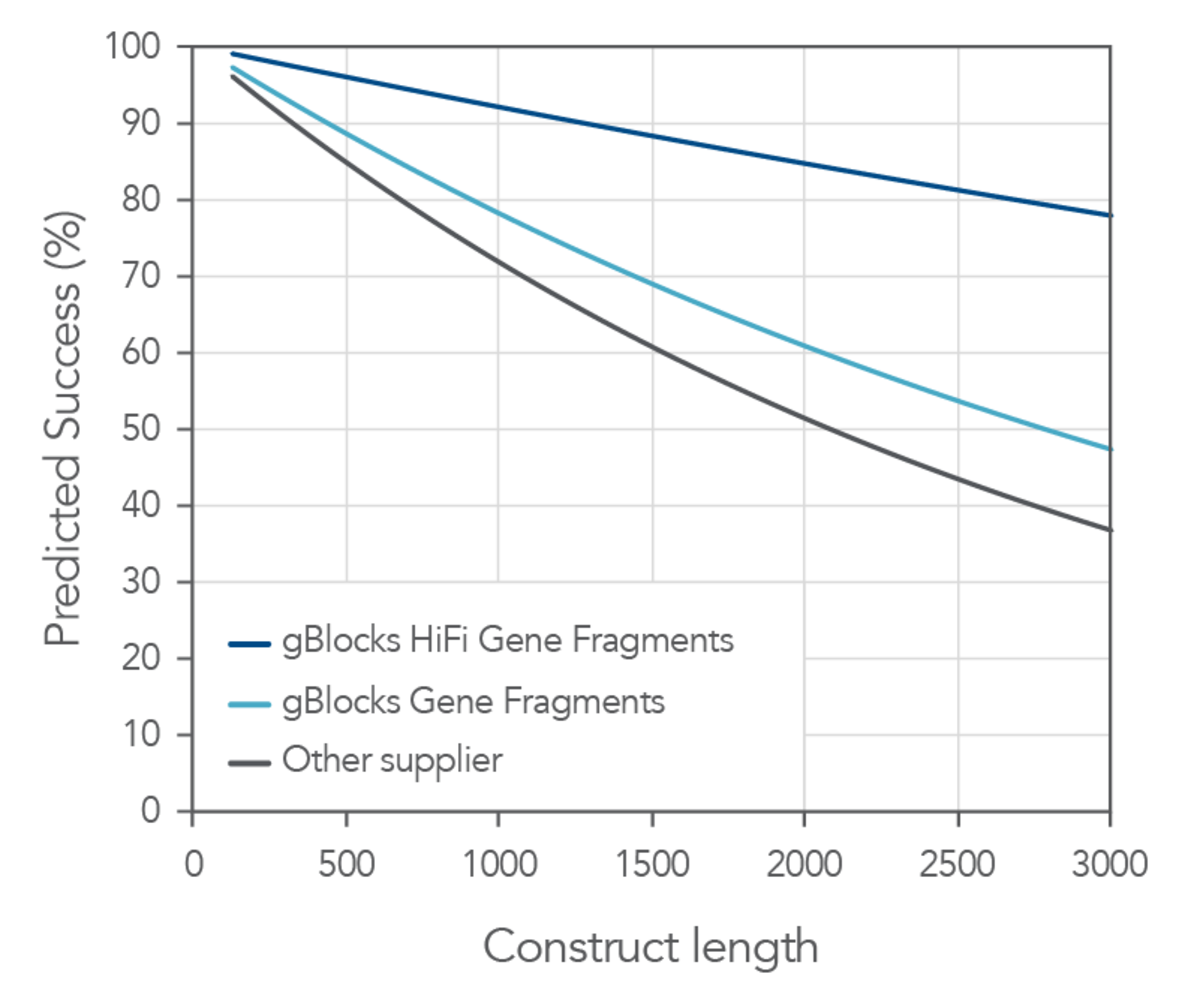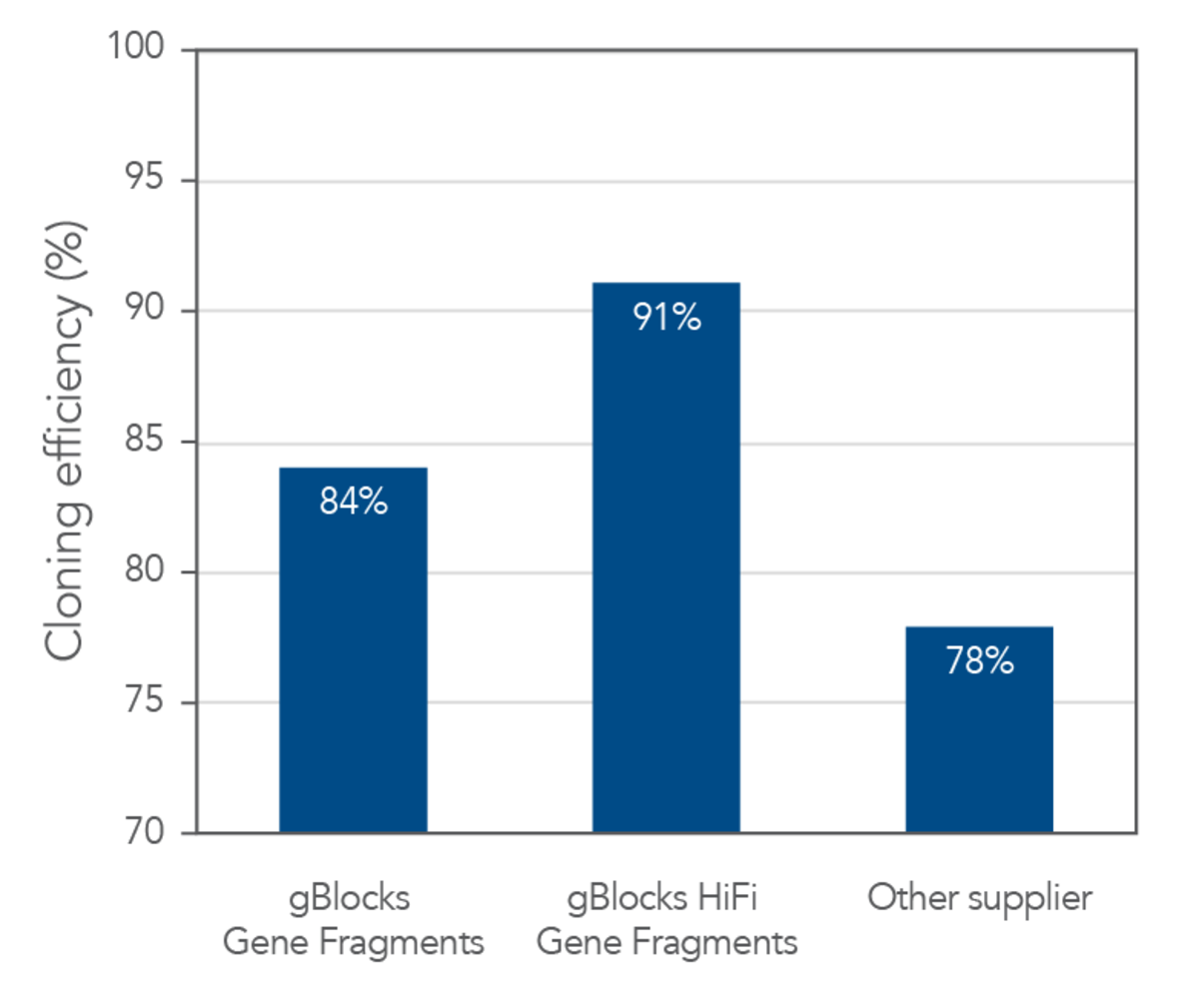gBlocks® synthetic genes
gBlocks® Gene Fragments are sequence-verified, double-stranded DNA fragments that ship in only a few working days for affordable and easy gene construction or modification, to use in applications such as antibody research and CRISPR-mediated genome editing, as qPCR standards, and more. gBlocks® synthetic genes are available in tubes or plates.
- Save on reagent costs with constructs as low as half the price of synthetic genes
- Industry-leading DNA synthesis methods ensure error-free genes
- Start your projects quickly with shipping in as few as 2 business days
- Sequence-verified, from 125 bp up to 3000 bp long
Tips for working with gBlocks® Gene Fragments
Special offer: receive one gBlock for free!
- Promo valid for a gBlock of up to 500 bp
- Contact us to find out more
Product details
gBlocks Gene Fragments
gBlocks Gene Fragments are double-stranded DNA fragments 125–3000 bp in length with a median error rate of less than 1:5000. They are manufactured with the same industry-leading, high-fidelity synthesis chemistries that were developed for our Ultramer™ DNA Oligos.
Each gBlocks Gene Fragment goes through a quality control process, which includes size verification by capillary electrophoresis and sequence identification by mass spectrometry. This rigorous testing ensures that most recombinant colonies obtained from cloning each gBlocks Gene Fragment will contain the desired insert. More complex sequences may need the end user to sequence additional clones.
gBlocks HiFi Gene Fragments
gBlocks HiFi Gene Fragments are double-stranded DNA fragments with sizes between 1000–3000 bp and verified with a median error rate of less than 1:12,000 via NGS. These high-quality, high-fidelity constructs facilitate the assembly of large and complex sequences, matching both the length and accuracy needed to minimize the introduction of unwanted substitution or deletion errors.
With either gBlocks or gBlocks HiFi Gene Fragments, you can easily assemble and clone your DNA fragment into the vector of your choice using a variety of cloning methods, including the Gibson Assembly® method (Synthetic Genomics, Inc.) and blunt- or cohesive-end cloning protocols. For added flexibility, you can order gBlocks Gene Fragments with or without a 5′-phosphate group.
gBlocks Gene Fragment Libraries
gBlocks Gene Fragment Libraries are pooled gBlocks fragments of 251 to 500 bp in total length. gBlocks Gene Fragment Libraries are ideal for generating recombinant antibodies or for protein engineering, allowing researchers to generate hundreds of thousands of constructs within a reasonable budget. The variable regions can be up to 18 consecutive N or K bases long and must be at least 125 bp from either end of the gene fragment (Figure 1).
For gBlocks Gene Fragment Libraries, each constant region is verified similarly to standard gBlocks Gene Fragments. The final library product is size-verified by capillary electrophoresis.
Performance
High fidelity and purity for gene assembly
Both gBlocks and gBlocks HiFi Gene Fragments demonstrate consistent high sequence fidelity and purity across various lengths (Figures 2 and 3).
IDT gene fragments are compatible with all cloning methods that require double-stranded DNA as a starting material, allowing easy assembly of your desired construct sequence into your favorite cloning system. Compatible cloning systems include but are not limited to traditional cloning, Gibson Assembly® (Synthetic Genomics), Golden Gate, Gateway® (Thermo Fisher), TOPO® (Thermo Fisher), TA, and blunt-end cloning.
Figure 2. The effect of error rate on predicted cloning success.
With an industry leading error rate of up to 1:12,000 for gBlocks HiFi Gene Fragments, IDT Gene Fragments demonstrate a high probability of first-time cloning success. Compared with alternate suppliers, gBlocks fragments and gBlocks HiFi fragments are up to 45% more likely to give a correct clone the first time when cloning fragments up to 3000 bps.
Figure 3. Demonstrated cloning efficiency.
Based on NGS sequencing of over 500 clones, gBlocks HiFi Gene Fragments (1000–3000 bp) and gBlocks Gene Fragments (125–3000 bp) exhibited a high degree of cloning success. Compared to an alternate provider, gBlocks fragments and gBlocks HiFi fragments showed a significant improvement in cloning efficiency leading to a reduction in the time and cost to find a correct clone.
Minimal screening effort needed to find your correct clone
Using IDT gene fragments can reduce the time and expense of screening colonies compared to fragments from other suppliers (Table 1). Cloning efficiency is affected by many factors, including the cloning method used, the stability of the cell line and plasmid, vector preparation, and toxicity or stress from expression of coding sequences. The values in Table 1 represent typical screening numbers needed when using a seamless assembly method, such as Gibson Assembly or NEBuilder® HiFi assembly (New England BioLabs), and when issues mentioned above are not significant contributors to error or selection.
Table 1. Minimal screening effort is needed with gBlocks and gBlocks HiFi Gene Fragments to find a correct colony.
| Length (bp) | gBlocks Gene Fragments | gBlocks HiFi Gene Fragments | Other supplier |
|---|---|---|---|
| ≤1000 | 2–3 | N/A | 5 |
| 1001–2000 | 3 | 2 | 6–10 |
| 2001–3000 | 4 | 2 | N/A |
For research use only. Not for use in diagnostic procedures. Unless otherwise agreed to in writing, IDT does not intend for these products to be used in clinical applications and does not warrant their fitness or suitability for any clinical diagnostic use. Purchaser is solely responsible for all decisions regarding the use of these products and any associated regulatory or legal obligations.




